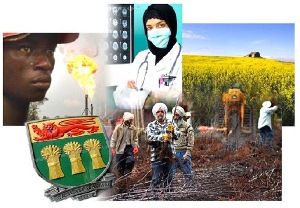Canada has been a country of immigrants, with a great number and variety entering the country over the last 400 years. In recent years, however, we have seen the government of accelerate the number of immigrants by nearly 75 percent, to over 400,000 per year.
One of the most important debates relates to what some foreign policy makers refer to as integration or assimilation.
In Canada, we do not use these terms, but most Canadians acknowledge that Canada has a maximum level of absorption capacity. The ability of absorbing large numbers of immigrants into Canada has two sides to it. One relates to the immigrants we select – do they have language to function in Canada, do they have the necessary skills, education, and experience, and do they have adequate settlement funds without relying on government.
For the most part, we do a good job of selecting immigrants who meet these requirements with our points based selection criteria. Many, if not most, immigrants have more money than the minimum, and many have savings, liquidated homes, businesses, and investments, allowing them to become financially established in Canada.
The other side of the absorption question is how Canadian society treats immigrants. Contrary to media reports, Canada is one of the most socially welcoming country in the world. Most immigrants are well received despite occasional inappropriate comments or questions, or the ordinary struggles people have fitting into a new country. Most immigrants succeed, and the vast majority of Canadians are helpful and supportive to newcomers. Sadly, a few immigrants inevitably fail.
There are, however, a number of areas where in which we perform poorly in helping immigrants to become productive citizens of our country. Fortunately, racism is seldom the biggest impediment to success for most immigrants. One of them is the credential recognition.
We hear stories about foreign trained professional arriving in Canada only to end up driving taxis or trucks because they cannot qualify in their professional fields. How is this possible, when we screen immigrants for education and experience? Surely the Federal Government only selects candidates who have the necessary background to qualify in their professions?
Unlike many other countries, where professional regulations are a federal responsibility, in Canada the provinces create the regulations. As such, Canada has over 400 Self-Regulated Professions, each with its own Provincial regulatory act. These regulations are enacted to protect the public, but in virtually all cases, they also protect their own members’ interest in ensuring that access to the profession is highly restricted. As a consequence, it is difficult, if not nearly impossible, for most foreign-trained professionals to enter a Canadian profession.
An example are the teachers’ societies, which are effectively unions running their own professional organizations with a force to restrict professionals from other countries, and even other provinces and territories. Even though most provinces and territories regulate who can become a teacher, the unions have a powerful impact. In fact, in two provinces, British Columbia and Ontario, they have regulatory authority. That is a conflict of interest, whereby the union or the College, has a strong say in who can qualify as a teacher.
Suffice it to say that despite that many amazing teachers have immigrated to Canada, with incredible credentials from their home-countries, when they arrive in Canada, the process to become qualified to teach, is often an arduous and long. For example, an immigrant could be the best teacher in South Korea or France, with a Master’s degree in teaching and mathematics, with accolades and published articles, but these qualifications may not allow them to teach in a Canadian province or territory. As stated on the Manitoba Teachers’ Society Website – “There is no single comprehensive program in Manitoba to aid international teachers in getting certification to teach in the province.”
Other than the obvious economic problems this causes for the immigrants and society, it also has the effect of limiting diversity of thought in the profession. If members of profession have been taught the same curriculum from the same ideological perspective, then we limit the diversity of thought and experience that can help our children. If diversity is truly our strength, then we are failing by limiting foreign trained teaching professionals from becoming members of their profession in Canada.
Governments must reign in the powers of these self-regulated professions. Provinces and territories must pass meaningful and powerful legislation that ensures that the regulations are achievable and sensible for foreign-trained professionals to become qualified in Canada. Then, based on these revised regulations, we can tailor our immigration policies so that only people who can qualify will be selected as immigrants. It is unfair to approve teachers, engineers, nurses, and doctors, who believe that with hard work and dedication they can become qualified professionals in Canada. As Canadians, we must ensure that the qualification process is fair and workable.
There is nothing inherently wrong with bringing in large numbers of immigrants to Canada. What is wrong is the plethora of self-regulated professions that arbitrarily limit otherwise qualified foreign-trained professionals from entering the profession. As such, regulated bodies must be legally obligated to put in place fair and reasonable process for foreign-trained professionals.
Randy Boldt is an experienced immigration practitioner and licensed immigration consultant and a senior fellow at the Frontier Centre for Public Policy.



